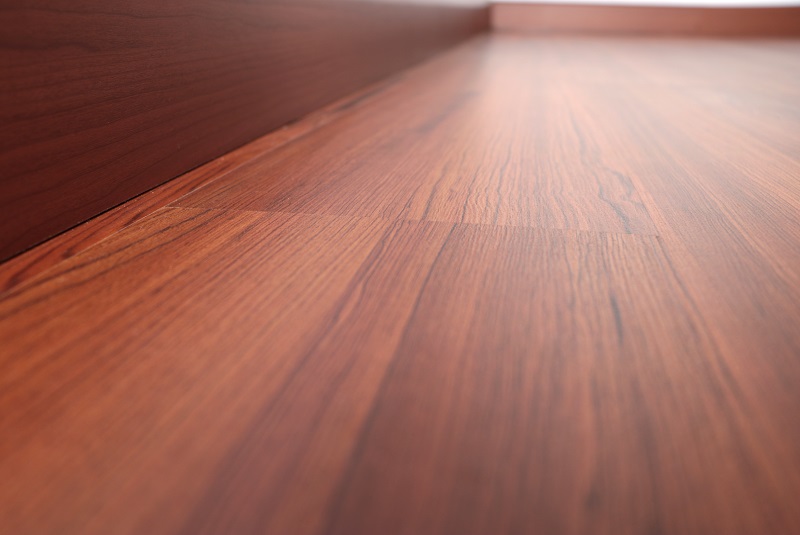
Fast forward to 2021, and the smart choice has changed to vinyl flooring. Vinyl flooring is durable, slip-resistant, can be installed faster than its predecessors and encompasses an array of products, including sheets, tiles, and planks made of flexible PVC; rigid tiles combining vinyl and ground limestone; and soft sheets woven from vinyl-coated fiberglass strands.
The vinyl floor is still evolving. Patterns and textures either look like the good old natural floorings or boldly head in a modern direction. These floors are also certified to meet strict standards for indoor air quality.  There is a lot more to vinyl flooring than the pattern and design. So, Clean Middle East took the initiative to speak with Charles El Maameri, Managing Director of Equinox Group and Founder of www.BOQ.ae; and Alexander Dolschenko, Technical Manager, Bona Country Distributor Team, EMEA in an exclusive webinar. Here is a brief excerpt.
There is a lot more to vinyl flooring than the pattern and design. So, Clean Middle East took the initiative to speak with Charles El Maameri, Managing Director of Equinox Group and Founder of www.BOQ.ae; and Alexander Dolschenko, Technical Manager, Bona Country Distributor Team, EMEA in an exclusive webinar. Here is a brief excerpt.
How to clean vinyl flooring
Vinyl floors are very easy to clean. Wiping or vacuuming them keeps them clean on a daily basis. Vacuuming them avoids the build-up of dust and dirt and makes it easier to maintain them. Wiping them with a damp mop or a cloth moistened with warm water and a neutral detergent helps to remove dirt and keep the floor in top condition.
 How to clean stains on vinyl flooring
How to clean stains on vinyl flooring
Cleaning stains from your vinyl flooring is also simple as compared to other floors. The stains can be treated by spot cleaning with a nylon pad and neutral detergent. Here are some tips:
- Oil, vinegar or lemon stains should be removed immediately because they lead to discolouration of the vinyl flooring. A mixture of warm water and a neutral detergent is enough to remove them.
- Ink or blood stains can be removed by applying diluted alcohol directly on the stain for a few minutes and then rinsing off with water.
- Pen and marker stains can be cleaned by applying a little white spirit on a cloth and rinsing well with water
- Rust can be removed using an anti-rust sponge.
Experts suggest a few more cleaning and care tips for maintaining and prolonging the life of your vinyl floor:
- Protect the vinyl floor by placing protective pads under heavy furniture, chair and table legs.
- Objects with rubber bottoms cause stains. Avoid them.
- Use doormats at entrances to prevent dirt or dust from being brought inside and make cleaning easier.
- Clean your floors with natural or neutral detergents. Bid adieu to the harsher ones.

How to maintain vinyl flooring
“Without a doubt, the floors are damaged everyday during the peak hours, which is why their maintenance is important”, says Alexander Dolschenko.
Vinyl floors are water, scratch and stain-resistant. If you follow the basic cleaning routine mentioned in detail above, there’s barely any need for ongoing maintenance. Unlike wood, for instance, you don’t need to apply wax or polish the surface to restore shine. A deep clean with soap and warm water restores vinyl’s original appearance.
However, as easy as it may seem, vinyl floors are not indestructible, and it's essential to take the correct measures to keep them in good condition.
How do you make vinyl floors shine?
Vinyl flooring is available in a vast range of colours, patterns and textures. This means that you can find a flooring finish that perfectly matches your preference. You can also look for a shinier look by choosing vinyl flooring with a high-gloss finish. Keeping them shiny will then simply be a matter of keeping them clean and dirt and dust-free. Unlike other types of flooring, such a real hardwood, there aren't specific products designed to make your vinyl floor shine. Instead, following the basic cleaning routine ensures that your vinyl floors look as good as the day you laid them.

The pros and cons of vinyl flooring
Vinyl flooring has many advantages. But it is not free from cons as well. The advantages and disadvantages of vinyl flooring depend on the type and quality of the product you choose.
The well-known advantages of vinyl flooring are many. It’s comfortable, resistant to damage and moisture, easy to install and maintain, affordable, and available in a large number of colours and designs. These advantages have made vinyl flooring a popular choice with a range of clients, particularly the design and budget-conscious ones. Also, vinyl floors are sustainable.
Charles El Maameri, says that there is so much advancement in vinyl floors today that we literally see them everywhere - in airports, offices, zoos, hospitals, etc. They have fantastic attributes which make them suitable for such diverse facilities. They are superb in terms of water resistance, they are also known to rescue the impact of sound and of course, their designs are getting more and more intricate in textures. They are good looking, hygienic and so much more.
Having said that, vinyl flooring can be difficult to remove if it’s glued down, it can dent and damage with heavy objects on top of it. It can even be punctured with very sharp objects.
Another disadvantage of vinyl flooring is that it is not very resistant to high temperatures and might even fade and discolour with excessive UV exposure. It is for these reasons that vinyl is not recommended for rooms which are too exposed to light such as verandas.
However, new technologies mean that vinyl flooring continues to evolve in both its design and construction, with some products now able to counter the disadvantages mentioned above.
How long do vinyl floors last?
Vinyl floors can last anywhere from 5 to 25 years, depending on their quality and how they're maintained.
Things to consider when choosing Vinyl Flooring:
• Price
• Square footage
• Size
• Shape: squares, planks
• Color
• Design: wood, stone, tile, other
• Installation Type: tile or sheet
• Durability features: wear layer
• Warranty: 15 years or more
• Air quality certifications
• Supplier
What is air quality certification for vinyl flooring?
Air quality certification is another important feature to consider when shopping for vinyl. Vinyl products have come a long way since they first came about. One area of major improvement is in air quality. When the first vinyl product was created by Waldo Semon in the 1920’s, it was a Vinyl Composition Tile which contained asbestos as a filler. Today asbestos is no longer used and harmful VOCs is far less of a concern with vinyl flooring products. Though you still want to look for quality VOC free products.
Is vinyl flooring healthy?
The unique selling point of vinyl flooring is that it's easy to clean - that’s an obvious health benefit. In addition, some manufacturers coat their products with antimicrobial coatings or embed wear layers with particles of silver, a potent germ killer.
However, what makes vinyl better than the rest is its benefits in maintaining indoor air quality.This is due to the potentially lung-irritating and headache-inducing VOCs that are off-gassed by vinyl flooring and the glues traditionally used to hold it down.
This is a brief excerpt from our exclusive webinar “Vinyl Flooring - Exploring the good, bad and ugly”. As mentioned earlier, there is a lot more to understand about vinyl floors before we set out to install them in facilities. To access the full webinar, click here.


 Search
Search.jpg)


